
The 1930's and 40's were difficult
times for black actors in Hollywood. There were a few films made
specifically for the African American audiences, with stars like Lena
Horne and Cab Calloway, showcasing their talents in light musical fair,
but for the most part, black actors were relegated to playing background
roles in most of the serious projects.
Pinky was a groundbreaking film,
in that it brought to light the issue of racism, at a time when America
would have preferred to ignore the issue altogether. Slavery may have
been a thing of the past, but in many parts of America, segregation was a
common fact of life, and Hollywood, for as liberal as it may have been, didn't think that audiences would be
willing to look at themselves in such a critical light.
|
The 1950's have been mythologized as a carefree decade, where life was
innocent, and the world was perfect. In reality, change was brewing,
and social norms were being upset, all of which would come to a head in
the 1960's.
The civil rights movement was in
full swing, particularly in the south, where black activist groups were
forming, and segregation and prejudice were being challenged head on.
Hollywood wasn't too quick to react, but some of the films that came out
of that decade did reflect some of the changing moods that were prevalent
In 1954, Dorothy Dandridge
became
the first black actress to receive a Best Actress nomination for her work
in Carmen Jones. The film was a musical remake of the classic opera,
and featured an all-black cast. In an ironic twist that echoed the
film Pinky, Dandridge, and her co-star, Harry Belafonte, were cast based
on their light skinned appearance, something that would be more appealing
perhaps, to white middle America. Despite the fact that Dandridge
was considered one of the most beautiful women of her day, she was never
able to break out of the racial mold that Hollywood had cast her in.
Despite her success, she even faced racism head on. A hotel that she
once stayed in drained their swimming pool to ensure that she didn't use
it. The troubled actress committed suicide in 1965.
The great Sidney Potier emerged in
the 1950's. Discovered on Broadway, he was hired by Darryl F. Zanuck
in 1950 to appear in No Way Out, a film about racial tensions in the
south. The film received a nomination for screenplay, and Potier
became the toast of Hollywood, as a respected dramatic actor.
Potier became the first black man
to receive an Oscar nomination in 1958, when he played opposite Tony
Curtis in The Defiant Ones. Potier didn't win that award, but he was
nominated again in 1964 for Lilies in the Field, a small film about a
laborer who helps a group of nuns in Mexico to build a church.
 While trade papers and black
groups, like the NAACP, promoted Potier, he didn't see the significance of
a win. "I do hope there will be residual benefits for other
Negro actors, but I don't fool myself into thinking that the effect will
be vast." He spoke about going to films during his childhood
and seeing black actors on screen. "There was the Negro devoid
of any dignity," he said to the press after winning the Best Actor
Oscar. "Good maids who laughed too loudly, good butlers afraid
of ghosts." Potier said that he wanted to make 'motion pictures
about the dignity, nobility, and magnificence of human life.' While trade papers and black
groups, like the NAACP, promoted Potier, he didn't see the significance of
a win. "I do hope there will be residual benefits for other
Negro actors, but I don't fool myself into thinking that the effect will
be vast." He spoke about going to films during his childhood
and seeing black actors on screen. "There was the Negro devoid
of any dignity," he said to the press after winning the Best Actor
Oscar. "Good maids who laughed too loudly, good butlers afraid
of ghosts." Potier said that he wanted to make 'motion pictures
about the dignity, nobility, and magnificence of human life.'
In the sixties, the Academy did
begin to recognize that brought to light the black experience,
particularly if Potier was involved. Shelly Winters would win her
second Oscar for A Patch of Blue, in 1965, playing a woman who objects to
her blind daughters romantic involvement with a black man, played by
Potier. Rod Steiger would win the Best Actor award in the Best
Picture of 1967, In
the Heat of the Night, playing a racist southern sheriff, against
Potier's Yankee cop.
It wasn't until 1972, that a film
about the hardships of black society, made the list of Best Picture
contenders. 1972 turned out to be a good year for black film makers
overall, when Martin Ritt's film, Sounder, received four nominations,
including Best Actor for Paul Winfield and Best Actress for Cicely
Tyson. Lon Elder III became the first black man to get a
screenwriting nomination.
Diana Ross was also in contention
for the Best Actress prize that year, for her role in Lady Sings the
Blues, the Billie Holliday bio. Heavy campaigning by Barry Gordy was
blamed for her ultimate failure to win the big prize, but 1972 was a tight
and controversial year for the Academy. Godfather was the undisputed
frontrunner, eclipsing Sounder, and any other film that was nominated
against it, and Liza Minelli gave the performance of her career in Cabaret,
while it was suggested that the 'black vote' was split between Tyson and
Ross for Best Actress.
Even though Sounder didn't win, it
still held promise of better things to come for black actors and
actresses. With such good representation that year, it seemed like
equality wasn't too far behind, and before long, the Academy would be
recognizing talent in the African American community. Sadly, that couldn't
have been further from the truth.
More
|
|
|
|
|

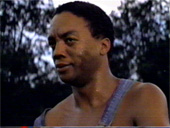
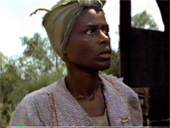
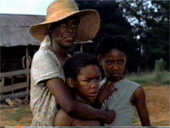
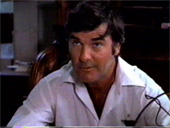
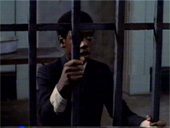


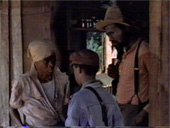
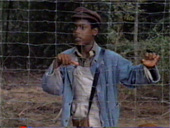
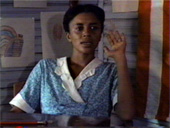
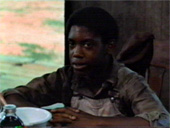
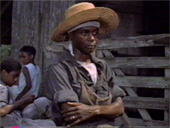
 While trade papers and black
groups, like the NAACP, promoted Potier, he didn't see the significance of
a win. "I do hope there will be residual benefits for other
Negro actors, but I don't fool myself into thinking that the effect will
be vast." He spoke about going to films during his childhood
and seeing black actors on screen. "There was the Negro devoid
of any dignity," he said to the press after winning the Best Actor
Oscar. "Good maids who laughed too loudly, good butlers afraid
of ghosts." Potier said that he wanted to make 'motion pictures
about the dignity, nobility, and magnificence of human life.'
While trade papers and black
groups, like the NAACP, promoted Potier, he didn't see the significance of
a win. "I do hope there will be residual benefits for other
Negro actors, but I don't fool myself into thinking that the effect will
be vast." He spoke about going to films during his childhood
and seeing black actors on screen. "There was the Negro devoid
of any dignity," he said to the press after winning the Best Actor
Oscar. "Good maids who laughed too loudly, good butlers afraid
of ghosts." Potier said that he wanted to make 'motion pictures
about the dignity, nobility, and magnificence of human life.'





